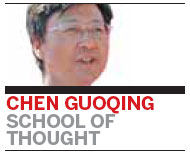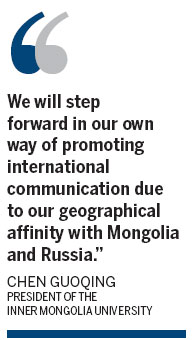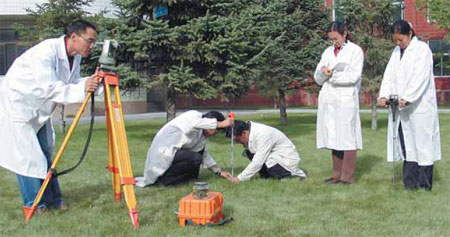IMU plans to expand international horizons
Tuition reform to charge students based on credit plans, president says
The top educational institution in the Inner Mongolia autonomous region has a clear ambition: to not only revive its leading academic role in Northwestern China, but to expand its international horizons.
"We expect that students here, no matter their ethnic group or where they are from, will have broad minds and great expectations for their future," said Chen Guoqing, 49, president of the Inner Mongolia University in Hohhot, the autonomous region's capital.
He knows that education will give the students added opportunities, both nationally and globally.
One-third of the nearly 30,000 students at the university are of non-Han ethnicity and 20 percent of the university's courses are taught in Mongolian.
Founded in 1957, the IMU was the first comprehensive university in Inner Mongolia. It was also the first to focus on students of non-Han ethnicity after the founding of the People's Republic of China.

The move was to answer a call by Ulanhu, the then chairman of the autonomous region, for an institution to simultaneously nurture talent from non-Han ethnic groups to contribute to the country's development and to revive ethnic cultures. Leading scholars from Peking University became the founding fathers of the IMU.
"We started from scratch, but the IMU strictly controlled the number of students at the very beginning," Chen said, saying the IMU was credited as one of China's key universities in 1978.
However, the booming market economy since the 1990s posed great challenges as professors left to teach at universities in developed areas where the pay was better.
Those days are gone.
"Thanks to rapid economic and social development in recent years, we've entered a new era," Chen said .
"We cherish talented individuals, and never hesitate to seize every opportunity to recruit more people."
Though "publish or perish" has been a common practice for college professors in China, Chen promoted a new performance-evaluation system after he became university president in 2010.
"We will not evaluate a teacher by how many articles they've published in academic magazines, though that may be an important reference."
Chen said the change was considered too dramatic by some colleagues.
"We've organized an independent evaluation team, inviting top scholars from off campus, to judge a professor's capacity for research and teaching."
Nearly 55 percent of academic staff at the IMU now have doctorate degrees, compared with only 25 percent five years ago.

"Excellent academic research results will spontaneously grow in a good environment. Good students are not forged in molds. We merely offer the earth to nurture them. Each student is unique, and that's why we will begin a tuition reform this year to charge individuals based on how many credits they plan to earn in a semester."
Chen proudly claims Mongolian studies at the university lead not only the country, but have a crucial role in the world. The IMU has a research squad that includes more than 160 people in the field.
The university took 12 years, from 2001, to complete its Comprehensive History of Inner Mongolia. The eight volumes of the work include more than 10 million characters and it is the largest work giving a detailed record of Inner Mongolia's history from prehistoric times to 2000.
The biggest breakthrough in the history is a volume, chiefly edited by Liu Zhongling, one of China's top ecologists, specifically reviewing Inner Mongolia's ecological changes through history.
The university has a traditional strength in ecology and biology, which also contribute to numerous ecological protection projects on the autonomous region's vast grasslands as well as boosting varieties of livestock. The National Center for Animal Transgenic Biotechnology was established at the IMU in 2012.
The achievements also earned the IMU global attention. The university was listed by the Ministry of Education as one of first 38 nurturing bases for overseas students in China. Nearly 800 foreign students now study there and 75 universities from 13 countries or regions maintain official cooperation agreements with the IMU.
"We will step forward in our own way of promoting international communication due to our geographical affinity with Mongolia and Russia," Chen said.
The university has founded a Confucius Institute in the Republic of Kalmykia, Russia, focusing on the area's close historic links to Mongolians, and plans to open more in two other neighboring countries. It has also co-founded scientific research centers with countries including the United States, Japan and Australia.
"I'm confident of enlarging our cultural influence overseas. Thanks to our consistently solid academic foundation and increasing number of professors with an overseas educational background, there will be a natural progression," Chen said.
Q+A | Chen Guoqing
What do you think are the most important characteristics students at the IMU should have?
There's no ubiquitous standard for good students, and we have to respect each student's uniqueness. However, generally, they should be honest, creative and tenacious, and never be afraid to try something new.
What is the biggest change you have brought to the IMU?
As a mathematician, I prefer to do something practical than to utter flamboyant words. I will leave others to judge what I've done.
How do you expect the IMU to contribute to the development of the Inner Mongolia autonomous region?
We will provide the best scientific support we can, act as a good think tank for strategic consulting, and open up an international outlook for Inner Mongolia.
What do you want to say to freshmen of the IMU?
Everyone is unique. Try your best to know yourself. Harbor great expectations for your future. Know our country better and know Inner Mongolia better. Please seize every moment on campus to enrich your experience and seize your destiny.
Contact the writers at wangkaihao@chinadaily.com.cn and yangfang@chinadaily.com.cn
|
Students conduct an experiment at the Inner Mongolia University in Hohhot, the autonomous region's capital. Provided to China Daily |



 Print
Print Mail
Mail






